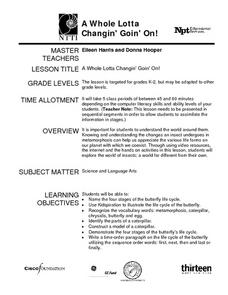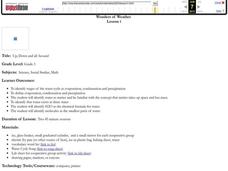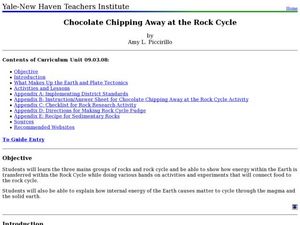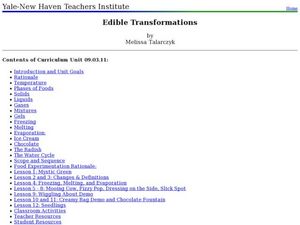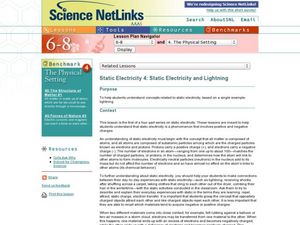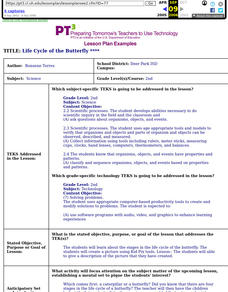Curated OER
Water Cycle Reading and Writing
Here is a great way to get pupils to express a scientific concept in a fun way. After hearing the story of Walter the Water drop and learning facts about the water cycle, the class will write a creative expository piece describing what...
Curated OER
The Water Cycle: States of Water
Elementary schoolers explore states of matter by concentrating on the ways in which water moves between its solid, liquid, and gaseous states in a variety of Earth environments. Learners interpret these movements through dance. The...
Pace University
Water Cycle
Rain, rain, go away—wait, there it is again! Elementary scientists learn how rain works its way through the stages of the water cycle with a series of classroom lessons and hands-on activities.
Curated OER
A Whole Lotta Changin' Goin' On
Here's a fabulous lesson on the life cycle of a butterfly. Youngsters are able to identify and understand the four stages of life. They construct models of a caterpillar and write a sequence story about the life of a butterfly. This...
Curated OER
Water Cycle
Third graders define and discuss evaporation, precipitation, condensation, and collection, color web pages to illustrate Water Cycle book, listen to stories about Water Cycle, play trivia game to demonstrate knowledge of what they...
Curated OER
Water Cycle Stories
Students create water cycle stories. In this water cycle lesson, students review the parts of the water cycle. They create a story that describes the journey of a water molecule as it makes its way through the cycle and into different...
Curated OER
The Water Cycle: Revising the Drafts
Young scholars explore states of matter by concentrating on the ways in which water moves between its solid, liquid, and gaseous states in a variety of Earth environments familiar to the students. Young scholars represent these movements...
Curated OER
Models of the Water Cycle
Students describe and review the stages in the water cycle. In groups, they build their own models of the water cycle and demonstrate where the water goes in a closed system. They answer discussion questions after the experiment to end...
Curated OER
The Water Cycle
Students develop a better understanding of the need to conserve our renewable resources. In this water cycle lesson students take notes, complete a guide sheet and illustrate the water cycle.
Curated OER
The Life Cycle of the Butterfly
Second graders study the life cycle of a butterfly by observing metamorphosis taking place in a butterfly pavilion. Students illustrate their understandings of the body parts of a caterpillar and butterfly, as well as the life cycle,...
Curated OER
Wonders of Weather
Fourth graders complete activities to study weather and the water cycle. In this water cycle activity, 4th graders observe a demonstration of the three stages of water. Students work in groups to complete a water cycle lab activity....
Curated OER
Chocolate Chipping Away at the Rock Cycle
Eighth graders identify the different types of rocks. In this earth science lesson, 8th graders compare and contrast rocks and chocolate cookies. They explain how materials are recycled beneath the Earth.
Curated OER
Microbial Influence on Earth's Systems
Students identify the different biogeochemical cycles on Earth. In this biology instructional activity, students observe microbes under a microscope. They compare and contrast respiration and photosynthesis.
Curated OER
Let's Make a Compost Cake
Learners create a compost cake. In this gardening and decomposition science lesson plan, students review and describe the "nutrient cycle." Learners create a compost pile, measure and record the dimensions and temperature of the pile,...
Curated OER
A Rock’n Earth
Seventh graders identify the three types of rocks. For this earth science lesson, 7th graders model the rock cycle using crayon shaving. They explain how rocks change as they go through the cycle.
Curated OER
Edible Transformations
Students differentiate the different phases of matter. In this chemistry lesson, students conduct several hands-on exercises to discover how matter transforms when mixed together. They identify the different stages in the water cycle.
Curated OER
Alternative Energy
Students discover the different alternative fuel sources. In this biology lesson plan, students identify the different stages of the carbon cycle. They explain the pros and cons of using alternative energy.
Curated OER
Amazing Water Changes
Learners explore the properties of water and how it changes states. In this kindergarten to 2nd grade science activity, students pair a hands-on science activity with two suggested books. This inquiry activity has...
Curated OER
Water, Water Everywhere
Students study the location of Earth's water and study the water cycle using a terrarium. In this water study instructional activity, students study a model globe for the Earth and find Alaska. Students locate the bodies of water and...
Curated OER
Life Cycle of the Butterfly
Second graders investigate the stages in the life cycle of the butterfly. They create a picture using Kid Pix tools. They give a description of the picture that they have created.
Curated OER
Physical Changes and the Water Cycle- Three
Third graders take note of the changes in the water level in a cup of water that is left out. Using a model of the water that depicts a lake and landscape that is being heated by a heat lamp, the students observe precipitation, and...
California Academy of Science
Composting: A Scientific Investigation: California Academy of Sciences
Garbage, recycle, compost: Does it really matter where we put our trash once we are done? By making detailed observations over seven weeks, kids will see which materials break down naturally to become a healthy part of the soil, and...
Curated OER
Bringing Up Birdy
Students explore biology by creating diagrams of animal life cycles. In this baby bird instructional activity, students view video clips of birds being born from incubation to flying on their own. Students utilize the Internet to...
Curated OER
Food Web Mobile
Students explain the main concepts of food webs and food chains. They
describe the role of animals, plants, and other organisms in cycling energy and matter through a food web by creating mobiles. Lesson contains adaptations for all levels.



